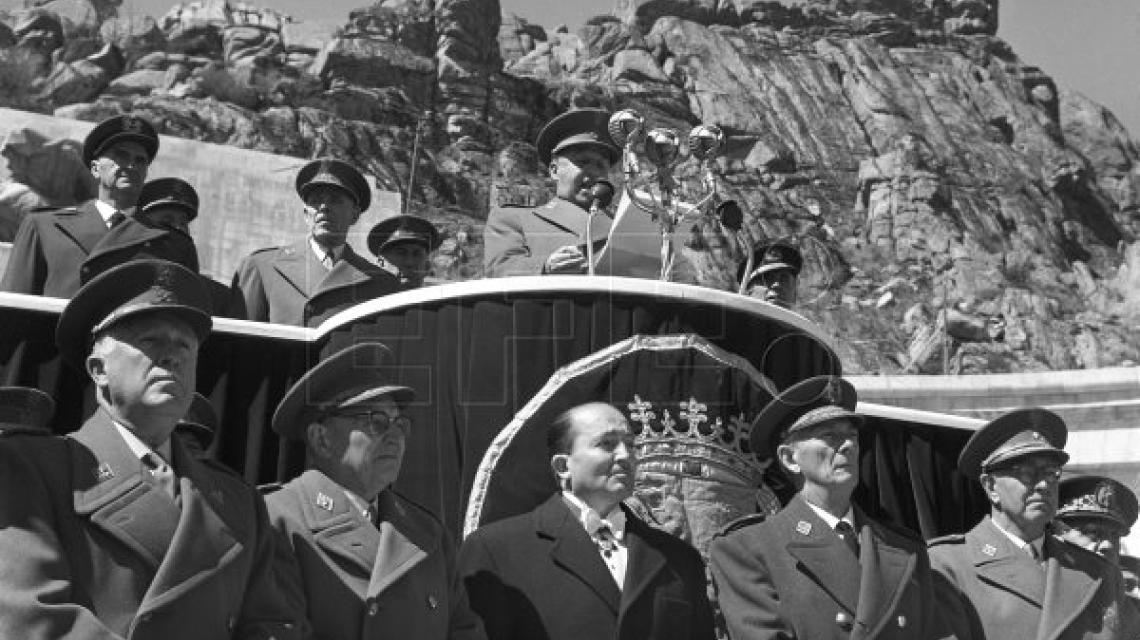
The Valley of the Fallen was officially opened on 1 April 1959, on the twentieth anniversary of Franco’s military victory. In an article published the same day in ABC, the abbot, Justo Pérez de Urbel, defined it as “one of the wonders of European civilization”. Franco arrived at the monument at about midday. After solemn mass, the dictator came out on to the concourse and addressed a large crowd including: ministers, parliamentary and legal officials, religious, civil and military authorities, representatives of the diplomatic corps, ensigns, ex-combatants, relatives of the fallen and thousands of followers from all over the country.
The choice of date was key to the memorial’s intended symbolism, as was Franco’s address which marked the climax of the inaugural ceremony. The following are excerpts from a speech that would be of defining importance in the life of a dictator who clearly pinpointed the significance with which he wished to endow the monument: to celebrate the military victory of 1939, which he described as the culmination of a providential crusade against ‘Anti-Spain’.
Spaniards:
When acts have the emotive force of these present moments, in which our prayers ascend to the heavens in our entreaty for divine protection for our Fallen, words always fail. How can we possibly express the depth of the emotion that seizes us in the presence of the mothers and wives of our Fallen, represented here today by these exemplary women who one day, knowing that the Fatherland required it of them, hung medals around the necks of their kindred and urged them into battle? On what inspiration can we draw to recount the heroic deeds of our Fallen? (…)
To commend the resolute tenacity of the defenders of the thousand little "Citadels", into which the Nation’s small garrison residences or barracks were turned, defended to extraordinary limits against superior forces, and with no hope of salvation; or to extol the heroism and enthusiasm offered up in bloody battles fought against the International Brigades, making them bite the dust of defeat (…)
Our war was clearly not just another civil conflict, but a true Crusade; as our reigning Pope then called it; the epic campaign of a new and for us momentous independence. Never, in our Fatherland were such great examples of heroism and saintliness offered up in such a short space of time, without one single weakness, one single apostasy, one single renouncement. We would have to go back to the Roman persecution of the Christians to find anything similar (…) The waging of our Crusade has been greatly marked by the providential and the miraculous. How else could we describe the decisive help of divine protection which we received throughout so many vicissitudes? (…)
Too great was the cost to Spain of that glorious epic campaign for our liberation for it to be forgotten; but the fight of good against evil never ends, however great its victory. It would be ingenuous to think that the devil will yield; he will invent new guises and ploys, for his spirit will continue to plot and take on new forms, in keeping with the times. Anti-Spain was beaten and defeated, but she is not dead. Periodically, we see her raise her head elsewhere and, in her pride and blindness, seek to poison and rekindle innate curiosity and the pursuit of the novelties of youth (…)
Our Victory was no partial Victory: it was a total Victory for us all. It was not administered in favour of one group or class, but for the Nation in its entirety. It was a Victory for the unity of the Spanish people, confirmed over these twenty years that have elapsed (…) Today, now that we have seen the fate of so many nations in Europe, some Catholic like ourselves, of our own civilization, that have fallen, against their will, into Communist slavery, we can better understand the significance of our political Movement and the value of the permanence of our ideals and of our inner peace (…)
It is in our interest to maintain, in an exemplary manner and with pure intentions, the brotherhood wrought in the ranks of the Crusade, to avoid the enemy, who is always lurking nearby, infiltrating our ranks (…) That requires us to stand watch over that for which they died; to keep alive the lessons of History from one generation to the next, and to make fruitful the blood which they so generously spilled, so that, in the words of José Antonio, it may be the last blood spilled in conflicts between Spaniards.
¡Arriba España! [“Long live Spain!”, a standard salute in Franco´s regime]